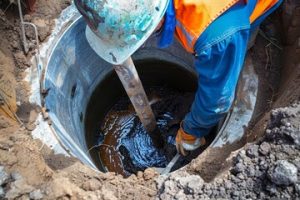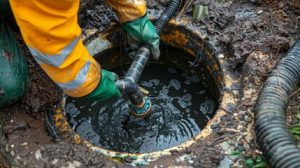Every household depends on invisible systems to function smoothly. One of the most vital yet overlooked is the septic system. It quietly manages waste, ensuring sanitation and environmental balance. Septic service plays the role of maintaining this unseen infrastructure with precision and care.

Modern septic service is no longer just about waste removal. It has evolved into a science-driven practice that combines engineering and environmental management. The process starts with assessing the system’s capacity, soil absorption rate, and tank integrity. This ensures that treatment and disposal occur without harming the surroundings. Contact The Septic Guys for professional help.
Advancements in septic maintenance have brought innovative inspection methods. Technicians now use sensors, cameras, and pressure-based diagnostics to monitor underground conditions. These tools detect potential blockages or leaks before they become serious problems. Such innovations make modern systems more efficient and less invasive.
Regular pumping remains essential to a healthy septic system. Over time, solids build up in the tank, reducing its capacity and efficiency. Scheduled pumping removes these materials and prevents backups that could lead to property damage. It is a simple yet vital part of responsible waste management.
Another key part of septic service involves wastewater treatment optimization. Specialized bacteria and enzymes are sometimes introduced into the tank to accelerate natural decomposition. These biological treatments improve system performance while reducing odors and sludge formation. It’s a sustainable approach that supports eco-friendly waste control.
Environmental safety is central to septic operations. When the system is poorly managed, it can leak contaminants into groundwater. Proper inspection and maintenance prevent this, protecting both water sources and human health. A well-serviced septic system contributes to a cleaner, safer environment for all.
Design and installation also fall within the scope of septic services. Professionals analyze land elevation, drainage, and soil composition before creating customized layouts. This careful planning ensures long-term performance and easy maintenance access. The balance between design and functionality determines the life span of the system.
A modern septic service provider often incorporates data analysis. Monitoring tools record flow patterns and waste volume trends. This information allows for predictive maintenance, helping prevent problems before they arise. It transforms a reactive process into a proactive one.
Homeowners are now encouraged to take a more active role in septic care. They are advised to limit excessive water use, avoid flushing chemicals, and schedule regular inspections. These small habits extend the system’s lifespan and reduce repair costs. Education has become a crucial part of septic service culture.
Technological integration is shaping the future of septic maintenance. Smart monitoring systems can send alerts directly to users when the tank reaches capacity. This prevents emergencies and ensures timely service. Such innovations bring convenience and control to an area once considered purely mechanical.
Beyond households, septic services play an important role in commercial and rural areas. Larger systems require industrial-scale management and compliance with strict environmental regulations. Professional teams ensure that these systems meet health standards while minimizing ecological impact. Efficiency and safety must coexist in every operation.
Modern design standards are now leaning toward renewable approaches. Some septic services explore energy recovery from waste. Through anaerobic digestion, methane gas can be captured and converted into usable energy. This creative process transforms waste management into a source of sustainability.
Public awareness about septic systems is also improving. People now recognize that these systems are not primitive but highly technical infrastructure. Workshops and online resources teach property owners about proper care and inspection. Knowledge strengthens community sanitation practices.
Emergency response is another critical aspect of septic service. Unexpected leaks, blockages, or system failures require swift action. Teams equipped with advanced tools can locate the problem quickly without unnecessary excavation. Rapid repair protects both property and the environment.
In the realm of environmental engineering, septic service represents the intersection of science and practicality. Its evolution reflects society’s growing respect for sustainability. By blending technology with ecological awareness, modern septic care ensures long-term harmony between humans and nature. This integration of innovation and stewardship defines the industry’s new direction.
The disposal field, where wastewater gets filtered through soil, is equally vital. It must be maintained to ensure effective absorption and purification. Soil testing and routine monitoring prevent clogging and preserve system function. Every part of the process contributes to the overall health of the septic network.
Even with modern technology, human expertise remains irreplaceable. Skilled technicians interpret data, evaluate field conditions, and provide precise recommendations. Their hands-on understanding ensures that automated systems operate correctly. This combination of human insight and technology is what makes septic service truly efficient.
Climate change and population growth continue to influence septic management strategies. Systems must now handle higher waste volumes and unpredictable rainfall patterns. Adaptive design and improved filtration help maintain stability despite these changes. Resilient septic systems are a key component of future infrastructure planning.
The economic aspect of septic services should not be ignored. Preventive maintenance is significantly more affordable than major repairs. Investing in routine inspection and pumping saves property owners from costly replacements. A well-maintained septic system is both practical and economical.
Future trends in the industry point toward digital transformation. Remote sensors, mobile reporting, and AI-based diagnostics are revolutionizing operations. These technologies enhance accuracy, reduce waste, and promote transparent service records. The result is a more accountable and efficient industry.
In rural communities, septic systems remain the backbone of sanitation. Proper servicing prevents pollution in nearby farms, rivers, and wells. The ripple effect of good maintenance extends beyond a single property. It supports the health of an entire ecosystem.
Meanwhile, research continues to focus on biodegradable treatment solutions. Scientists are studying microbes that can accelerate waste breakdown naturally. This could minimize chemical dependency and further improve environmental compatibility. Innovation ensures that septic service remains aligned with ecological goals.
The human factor is still at the core of septic care. It requires responsibility, awareness, and commitment to hygiene. When users understand their system, they contribute to a more sustainable environment. Each small effort strengthens the chain of sanitation.
New materials are also changing tank construction and performance. Lightweight composites and corrosion-resistant linings extend system durability. These innovations reduce the risk of leaks and structural damage. They represent the merging of engineering and environmental design.
Community-level septic planning is another growing trend. Shared systems reduce installation costs and distribute maintenance responsibilities. This cooperative approach promotes inclusivity and resource efficiency. It reflects a collective understanding of environmental responsibility.
At its heart, septic service is about protecting life. By managing waste safely, it prevents disease and environmental degradation. Every inspection, repair, and upgrade serves that ultimate purpose. Behind every clean home is a system that works quietly and effectively.
Education and advocacy continue to shape the future of this field. People are learning to view septic care as an investment in health and sustainability. Awareness drives better decisions and more consistent upkeep. This cultural shift ensures long-lasting results.
The modern septic industry blends innovation, discipline, and ecological respect. It is no longer a hidden or neglected aspect of infrastructure. It has become a model for how technology and responsibility can coexist. Its quiet operation belies its powerful role in maintaining human well-being.
Septic service stands as a symbol of unseen efficiency. It reflects how everyday maintenance supports the larger system of life. Through innovation, education, and responsible management, it continues to evolve. The future of sanitation lies beneath the surface, working silently for a cleaner world.
